Show and tell A squad of Free Press reporters hits the town to report on how the arts community is rebounding, adapting as the pandemic drags on
Read this article for free:
or
Already have an account? Log in here »
To continue reading, please subscribe:
Monthly Digital Subscription
$0 for the first 4 weeks*
- Enjoy unlimited reading on winnipegfreepress.com
- Read the E-Edition, our digital replica newspaper
- Access News Break, our award-winning app
- Play interactive puzzles
*No charge for 4 weeks then price increases to the regular rate of $19.00 plus GST every four weeks. Offer available to new and qualified returning subscribers only. Cancel any time.
Monthly Digital Subscription
$4.75/week*
- Enjoy unlimited reading on winnipegfreepress.com
- Read the E-Edition, our digital replica newspaper
- Access News Break, our award-winning app
- Play interactive puzzles
*Billed as $19 plus GST every four weeks. Cancel any time.
To continue reading, please subscribe:
Add Free Press access to your Brandon Sun subscription for only an additional
$1 for the first 4 weeks*
*Your next subscription payment will increase by $1.00 and you will be charged $16.99 plus GST for four weeks. After four weeks, your payment will increase to $23.99 plus GST every four weeks.
Read unlimited articles for free today:
or
Already have an account? Log in here »
Hey there, time traveller!
This article was published 17/12/2021 (1453 days ago), so information in it may no longer be current.
Call it a window of entertainment opportunity.
Earlier in December, before the Omicron variant of COVID-19 became the latest hot topic during the pandemic, Free Press entertainment journalists, armed with vaccination cards and curiosity, ventured out to nightclubs, theatres and concert venues to learn, and to learn again, what a night on the town was like.
For many, an evening of music, acting, comedy or dance proved to be an escape — for a couple of hours, at least — from the pandemic that has affected every part of our lives since its appearance in Manitoba in March 2020.
Vaccination cards and IDs were shown at the doors, but mask use was as varied as the entertainment on offer. For some, letting their hair down meant taking their masks off too, while for others, the masks stayed on until they walked outside again.
And in one case, the show didn’t even go on, which could very well be a sign of what’s to come for entertainment in Winnipeg as COVID-19 cases around the world rise again.
So join us, from the safety and comfort of your own homes, in a glance at five nights on the town during a pandemic.
Tuesday, Dec. 7, Times Change(d) High & Lonesome Club
The Times Change(d), a small but popular downtown honky-tonk at the corner of Main Street and St. Mary Avenue, hosted its annual Tom Waits Birthday Party, which had Mayor Matt Allen and the Little Buddies on stage with special guests. It was a jam session of Waits favourites, and the band played Jockey Full of Bourbon, Chocolate Jesus and Ninth and Hennepin, among others.
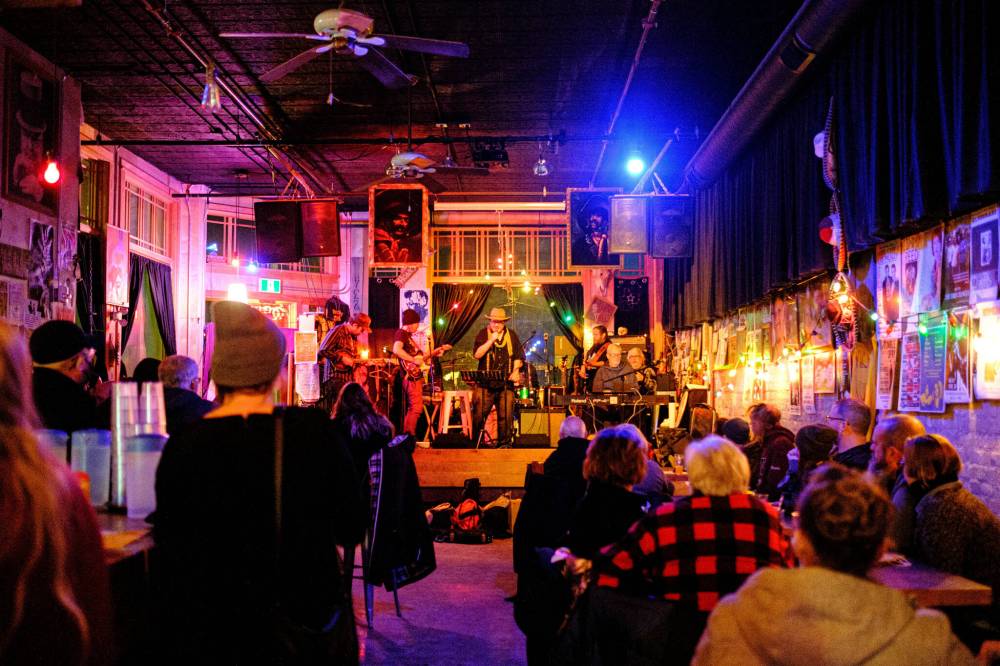
It’s an informal place with many quirks: John Scoles runs it, and he introduces the band by shouting into a megaphone. Posters for old shows line the walls, and if you just want a glass of water, the jug and some glasses are there for you.
It’s an old-timey place with an old-timey feel.
Dec. 7 fell on a Saturday in 2019, and the joint was more crowded that night for a similar Waits tribute, but the bar, the city and the world hadn’t gone through almost two years of a pandemic when the bands that night played Downtown Train and Tom Traubert’s Blues.
It was close to capacity this night too, but during a pandemic, that meant there was plenty of room to manoeuvre. There was no bumping at the bar and there was even room for a couple to dance. If you wanted a seat, there was one to be had.
Many people here were mainstays at the nearby venue Blue Note Park, which Scoles also ran this summer, and folks were following the pandemic rules that applied there, even though the Blue Note was an outdoor space.
When people were up and around, going to the bar or to the bathroom, masks were on. Masks were often doffed when sitting at the tables and sipping on a beer or a glass of wine.
There’s a double-vaccination check at the door for everyone entering, so there’s a similar sense of security to the Jets game going on just a few blocks away.
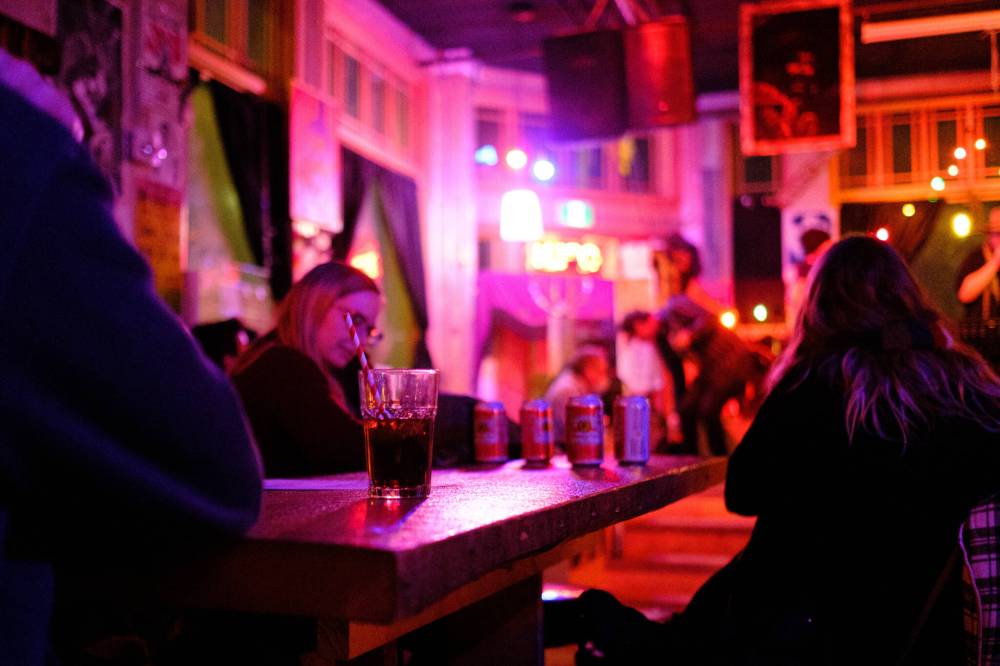
Waits’ songs are an ideal fit for the Times Change(d), as the bar is as much a one-of-a-kind place as Waits is as an artist. Scoles likens the place to a community, and many of that community turned up for the show. Some of the special guests, such as Dan Scram, who sang a nice version of Hold On, sat at the tables waiting for their turn onstage.
Mayor Matt introduced Big Dave McLean, the Juno Award winner and Order of Canada member who’s about as big as it gets at this place. His Sunday jams have returned too, after provincial pandemic restrictions allowed nightclubs like the Times Change(d) to reopen after 18 months of being locked up.
“Let’s hear it for a real newcomer to the Winnipeg music community,” Mayor Matt proclaimed. It’s been a long time since seeing the bluesman play in person, and watching him play Get Behind the Mule was a treat.
David Letterman, another quirky man, is a big Waits fan too; he had the songwriter on his talk show several times over the years, including during the Late Show’s final week in 2015. On that night, Waits growled a song specifically for the occasion, one of his bawlers, Take One Last Look.
Omicron is on the rise and COVID anxiety has returned, but here’s hoping there will be many more looks at the Times Change(d) and other entertainment venues for us all in 2022 and beyond.
— Alan Small
Tuesday, Dec. 7, Royal Manitoba Theatre Centre
It’s dark and cold and the streets are nearly empty. The only indication there’s a show on tonight is the lack of available parking in the blocks surrounding the Royal Manitoba Theatre Centre.
Fifteen minutes until curtain. I find a spot, scale an icy snowbank and join the other parka’d stragglers hustling toward the warm glow of the foyer.
I’ve been to a handful of ticketed events in the last few months and have yet to make a smooth entrance at a venue. Tonight is no different. Without fail, I always assume the person standing at the door with a scanner in hand is looking for my ticket. They’re never looking for my ticket. Twenty months into a pandemic, they’re, obviously, looking for my proof-of-vaccination card.
After fumbling my way inside, I find the ticket scanner on a table outside the auditorium. Signage throughout the foyer offers reminders about the mask policy and QR links to the virtual program, though physical copies are still available.
It’s a full house — or as close to full as the house gets these days — for tonight’s performance of Orlando, RMTC’s first live show in more than 600 days.
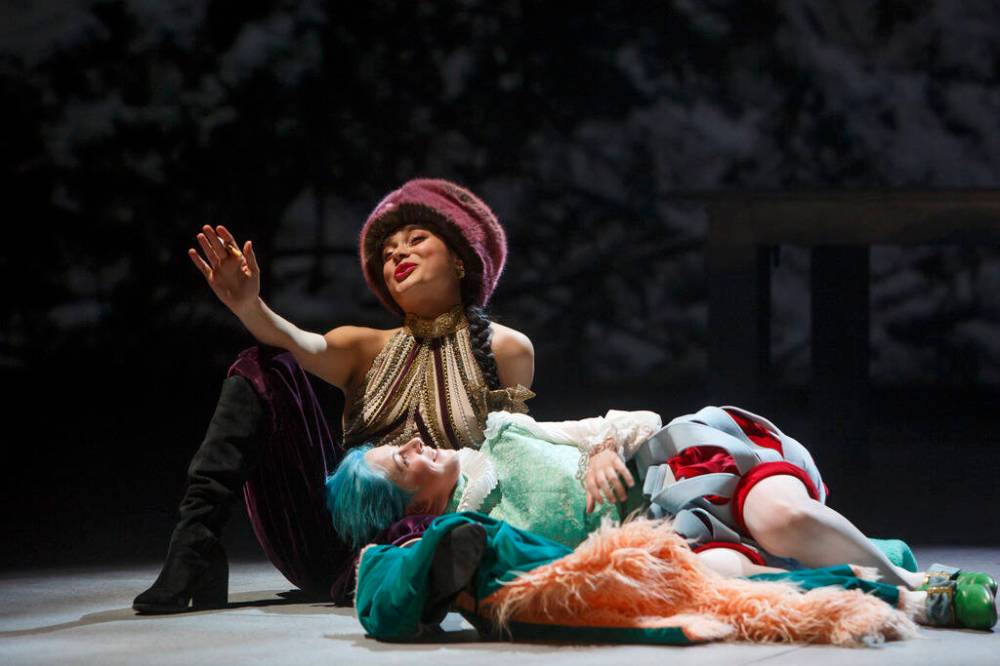
Capacity in the John Hirsch Mainstage has been reduced to allow for physical distancing between patrons. Coat check is rendered unnecessary with so many empty seats.
I’m attending alone and eavesdropping shamelessly. Most of the chatter in my row is about the world outside: whose family members have been vaccinated or not, who has fallen ill and what rising case counts might mean for the upcoming holiday season. It’s a reminder that a night of escapism can’t erase the anxiety of the pandemic.
The lights dim and a recorded message from artistic director Kelly Thornton plays. After a land acknowledgement, she announces that, tonight, the role of Sasha will be played by Melissa Langdon. Local actor Sophie Smith-Dostmohamed will not take the stage. Another reminder.
Tonight’s show is the first after a weekend of cancellations owing to a positive COVID-19 diagnosis among the production team. In a followup interview, theatre communication staff decline to comment on the health status of cast members, but it’s not hard to connect the dots.
Watching live theatre in a dark room full of masked strangers underlines everything that’s been missing during months of Netflix bingeing and virtual performances.
The curtain rises and the show — an adaptation of Virginia Woolf’s novel Orlando — begins. I’m nervous for the actors and for myself. Will they slip up? Do I even know how to enjoy a play anymore? The story chugs along and I relax.
Watching live theatre in a dark room full of masked strangers underlines everything that’s been missing during months of Netflix bingeing and virtual performances. Small things, like the smell of the program books and an intermission glass of wine poured into a tiny plastic cup, which I’m convinced have gotten smaller over the last 20 months. And big things, like clapping and the sensation of a collective reaction — laughter, dismay — moving through the crowd. It’s a fleeting moment of connection during uncertain times.
— Eva Wasney
Thursday, Dec. 9, the Osborne Taphouse
Shortly after 9:30 p.m., Men in Cheap Suits frontman Jeremy Koz arrives at the Osborne Taphouse in advance of the first of the band’s three sets of funk and soul covers. He’s running a couple of minutes late, having come straight from work, but is already in his sparkly gold blazer.
For the past few months, the seven-piece Men in Cheap Suits (with each member sporting a different coloured suit) have held down a weekly gig dubbed Funky Thursdays at the Osborne St. bar, located in the former home of the Toad in the Hole.
The Juno-nominated Koz, 41, is a busy guy. He fronts eight different acts in the city, including Men in Cheap Suits, performing under his own name and as part of groups such as Deep Dark Cave, Indian City and the Big City All Star Band.
“We’ve taken such a hit — everybody knows that anything can happen,” he says before the first set. “I have some great gigs next year. Could they get cancelled? Absolutely. But you know, all you can really do is be hopeful and make the most of the gigs we’re playing… To be able to fill up the calendar as an artist with live performances, it’s just such a blessing.”
Corporate events, holiday parties and weddings normally fill a fair bit of Koz’s calendar, both with Men in Cheap suits and otherwise. And after taking a hit in 2021, those gigs seem to be starting to come back in 2022. “I’ve filled the calendar — I’m booked until April,” Koz says. “Every weekend, I’m just trying to fill it up as much as I can—weekly gigs, rotating gigs, it’s a mixture.”
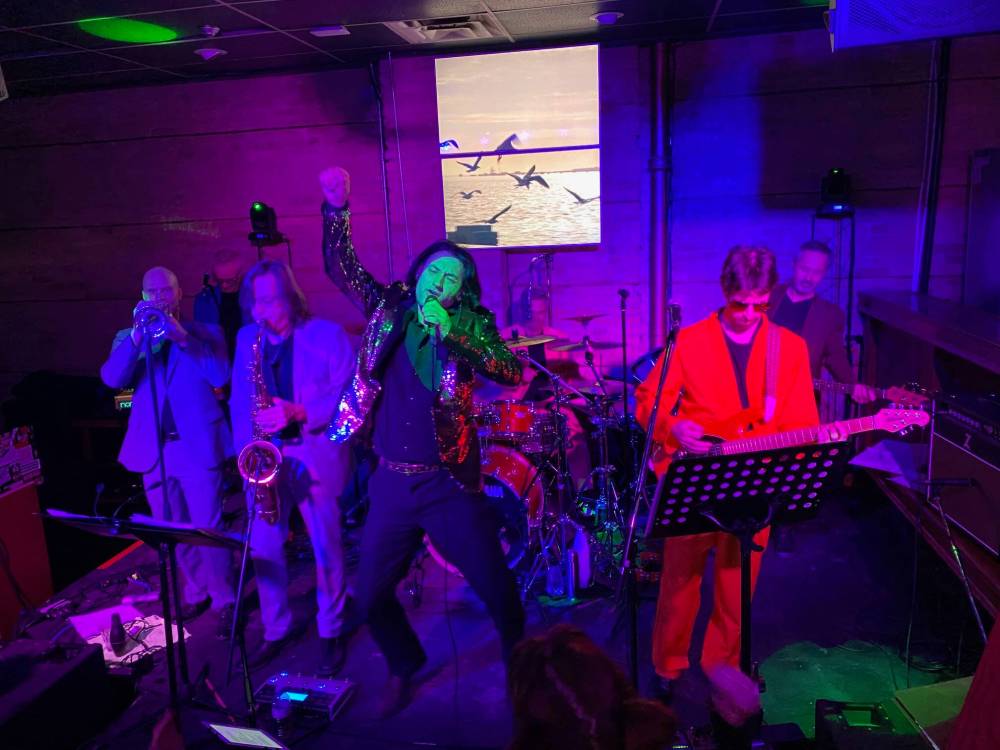
Men in Cheap Suits started in 2019, and began their Funky Thursdays residency at the Osborne Taphouse in late summer. “When we started this gig, you couldn’t dance,” Koz recalls as a few more people file in, offering up proof of vaccination and ID to the door staff. “And then there was one night specifically where at midnight, the regulations changed and people were like, ‘Wait — can we dance at midnight?’ It almost seems normal now.”
That sense of almost-normalcy is certainly clear among those who have jammed the small dance floor, both masked and unmasked (the latter with drinks in hand), while others watch from their seats as the band rips into its first high-energy set.
In the back of the room among the 50-some people in attendance, 26-year-old Claire is getting a beer from the bar and stops to talk for a moment. “I live in the area, and it just struck me as the mood to come in to see some live music tonight,” she says. “I come regularly enough — usually it’s the people I know that I’ll come see.”
She knows Koz (who she calls a “great entertainer”), and her partner is a musician; they’ve been taking the return to live shows in stride. “I’ve been getting my toes in the water for a while now,” says Claire. “I just bought a ticket for the Shakey Graves and Begonia show at the Burton Cummings Theatre (on May 9, 2022).”
As Claire rejoins her partner, the band begins the “Ooka-chaka ooka ooka” opening chant of Blue Swede’s Hooked on a Feeling, and the crowd erupts. They certainly seem ready to shake, shake, shake, to the point where an impromptu conga line forms during a rousing version of Harry Belafonte’s Jump in the Line (à la Beetlejuice).
The first set closes with a raucous, improbable medley of fan favourites — a funky version of the Beatles’ Get Back, Huey Lewis and the News’ The Power of Love, Steve Winwood’s Roll With It, Phil Collins’ Sussudio and the Edgar Winter Group’s Free Ride.
Until things get worse or restrictions are heightened, it seems most of those watching the band are content to take Winwood’s advice.
— Ben Sigurdson
Saturday, Dec. 11, Rumor’s Restaurant and Comedy Club
If you had any doubt that laughter is the best medicine, Saturday night’s sold-out show at Rumor’s might have convinced you. Among the three office Christmas parties crowded around the long tables near the stage was the cardiology department from St. Boniface Hospital, possibly shoring up their medical savvy with a few belly laughs.
However, the club’s general manager and booker Tyler Schultz warns that the packed early show featuring Vancouver comedian Sunee Dhaliwal shouldn’t be used as a yardstick for how business is faring during the pandemic’s fourth wave in the province.
“Party bookings in general are down 75 per cent,” he says, explaining that many offices and workplaces don’t know whether all their staff are vaccinated and don’t want to risk alienating them from a holiday event (Rumor’s requires double vaccination for entry; Schultz says he’s also had to cancel a couple of touring standups who weren’t vaccinated.)
That requirement also slows admittance to the Corydon Avenue basement space, which had a line snaking up the stairs half an hour before showtime, as staff diligently checked proof-of-vaccination QR codes against photo IDs.
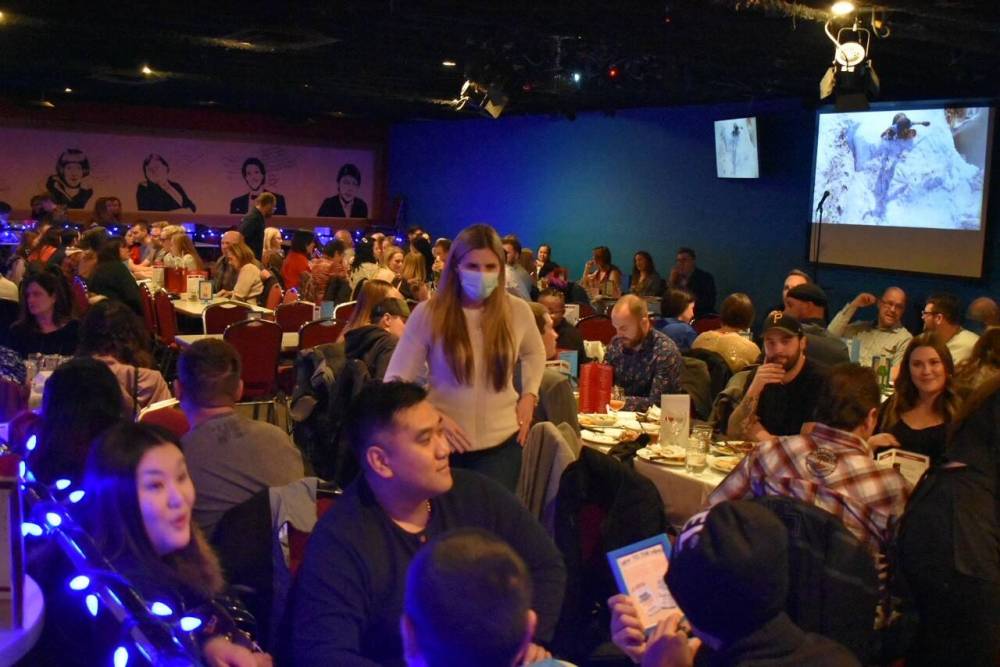
On Saturday, however, the vibe was raucous and ribald, with the gregarious Dhaliwal doing a lot of crowd work in between stories about his Indian parents and the Wild West approach Alberta is taking to the pandemic.
The audience responded much like a group of people who haven’t been out much lately, engaging in some mild heckling and gamely playing along with Dhaliwal’s good-natured ribbing.
Looking around the room, you’d be hard-pressed to remember the city was still in the throes of a pandemic — comedy club audiences tend to eat and drink throughout the show, so mask-wearing was largely reserved for trips to the restroom.
The service, however, felt a bit slower and more erratic than usual; Rumor’s is typically a well-oiled machine when it comes to drink delivery (a lubricated crowd is generally a happy crowd).
Schultz, who was busy shlepping drinks himself, confirmed that, as with many other restaurants and lounges, the club has had some trouble with staffing after being dark for so long.
However, small glitches aside, sharing a couple of hours of laughs with a bunch of vaccinated strangers feels something like a cure for what ails us.
— Jill Wilson
Tuesday, Dec. 14, Burton Cummings Theatre
It’s just after 7 p.m. on an unseasonably warm December night, and the doors should be opening for July Talk’s show at the Burt.
But Smith Street is a ghost town. No concertgoers are lining up outside under the glow of the digital marquee. It’s eerily quiet, just the hiss of tires on wet pavement. Inside, the theatre is dark, as it’s been for most of these past 21 months. And the doors themselves are locked. Scotch-taped to the glass is a hastily typed apology on Burton Cummings Theatre letterhead, confirming what many had learned just hours ago:
“Tonight’s show has been postponed.”
A literal sign of the times.
That afternoon, July Talk posted on social media that someone in its touring team had just tested positive for COVID-19, forcing the Toronto alt-rock outfit to scrap the remainder of its western Canadian tour — dubbed, ironically, the “Live At Last” tour. “Stay safe out there,” the tweet concluded, accompanied, appropriately, by the crying and black heart emojis.
Fans (mostly) understood, including those who had already travelled to Winnipeg to see the salt-and-sugar interplay of co-lead singers Peter Dreimanis and Leah Fay. “I was really looking forward to it,” one ticketholder wrote. “Covid sucks!!!!”
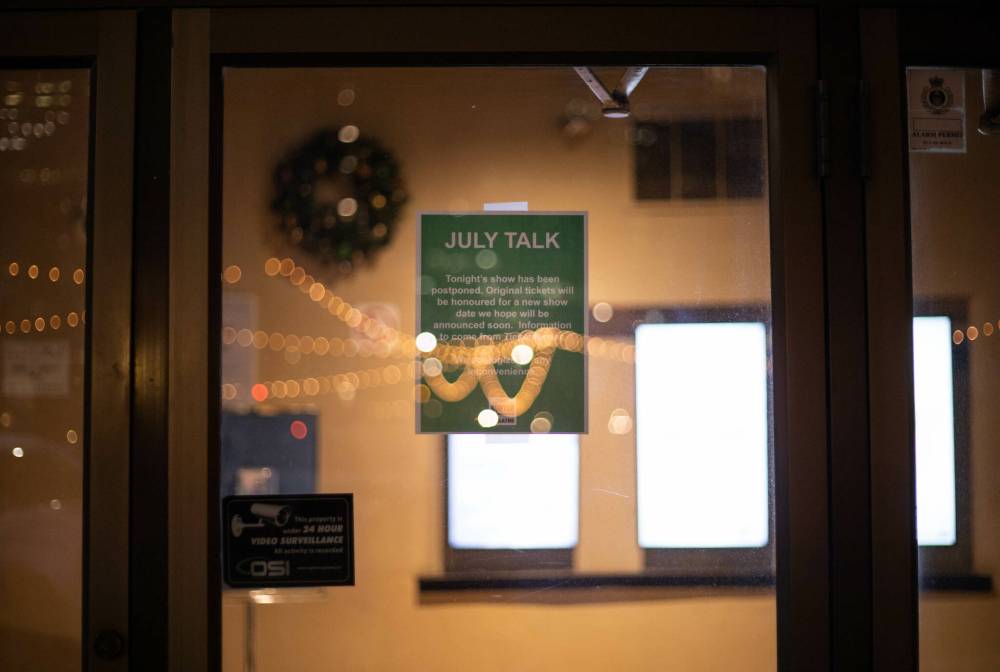
For fans, part of “learning to live with the virus” will necessarily mean learning to live with these kinds of disappointments. This is not the first concert to be postponed by COVID, nor will it be the last. What has this pandemic been if not experiences deferred?
For hard-touring Canadian indie acts such as July Talk, these kinds of postponements are yet another blow in a long, pandemic-related line of blows. This is their livelihood. And this is a band that grew its fanbase largely on the strength of its incendiary live shows.
How quickly the relief of being “live at last” is supplanted by the anxiety of our current reality. How quickly things change.
The advent of vaccines has meant we can have these kinds of shared experiences again, though in a pandemic-altered way. But vaccines cannot guarantee a completely frictionless return to normal. So long as COVID-19 is in our lives — and so long as bands such as July Talk continue to prioritize the safety of others — we will occasionally encounter darkened theatres and locked doors.
— Jen Zoratti
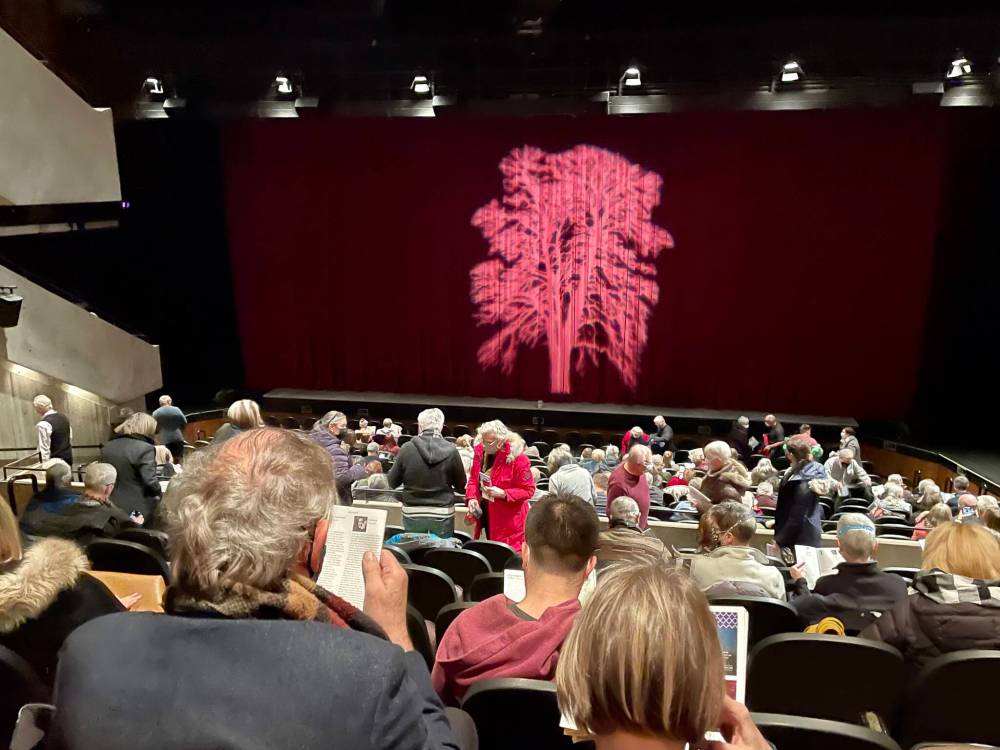
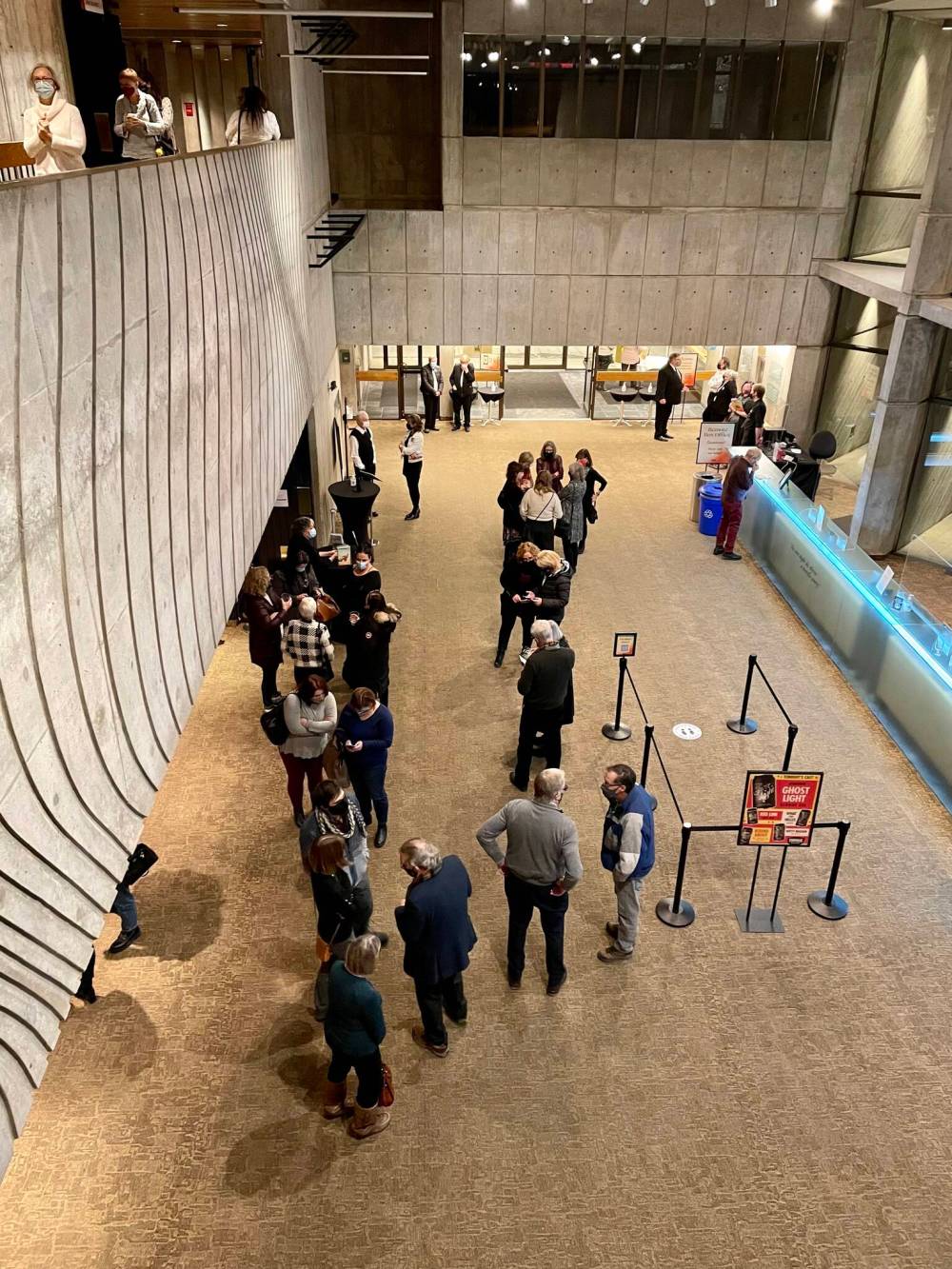

Alan Small has been a journalist at the Free Press for more than 22 years in a variety of roles, the latest being a reporter in the Arts and Life section.



Jen Zoratti is a Winnipeg Free Press columnist and author of the newsletter, NEXT, a weekly look towards a post-pandemic future.

Jill Wilson writes about culture and the culinary arts for the Arts & Life section.
Our newsroom depends on a growing audience of readers to power our journalism. If you are not a paid reader, please consider becoming a subscriber.
Our newsroom depends on its audience of readers to power our journalism. Thank you for your support.

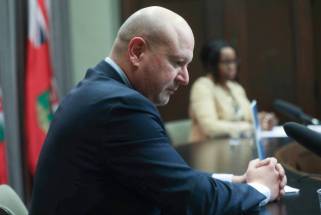
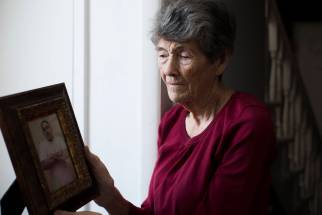
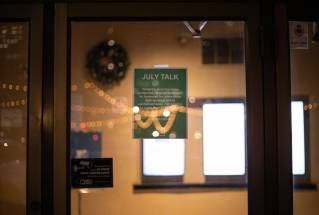
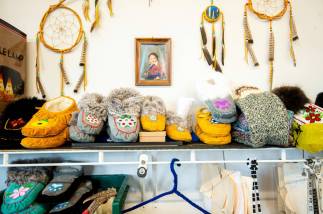


.jpg?h=215)